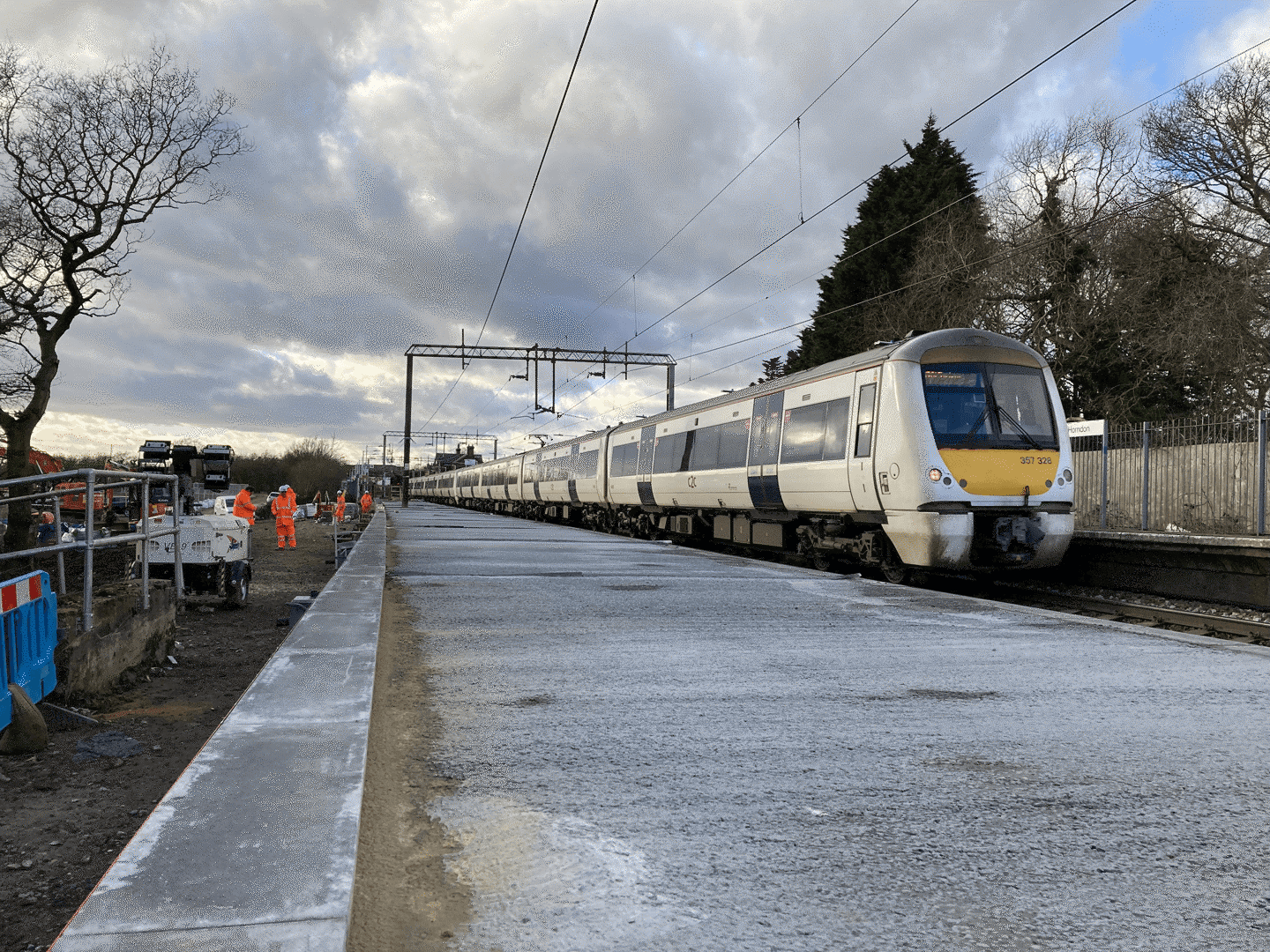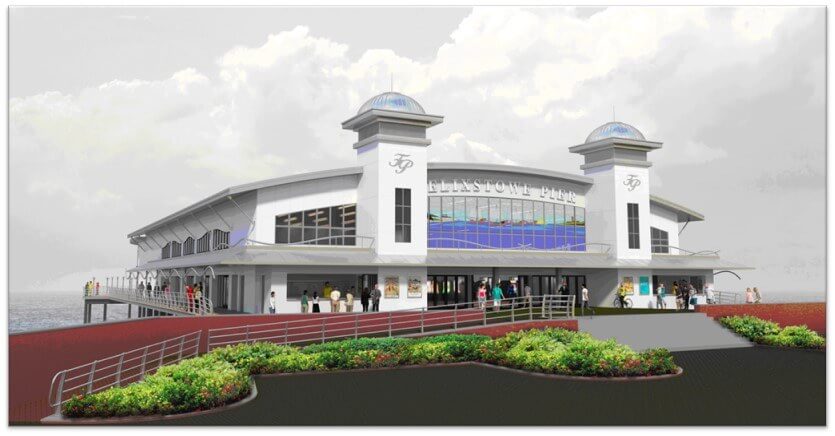
West Horndon Platform Reconstruction
Following inspection work that deemed part of the length of platform 1 beyond economic repair, an effective design was successfully developed within stringent timescales, and

Haydn Evans offer a wide range of Pre-Planning services to ensure that projects get off to the best start possible. Our Pre-Planning service is delivered by highly experienced individuals, with a long history of successfully implementing and providing support for planning applications. We work with land owners, planning consultants, architects and developers, tailoring our approach to suit the needs and aspirations of our clients and the constraints of the site.
we take a holistic approach to our review of the site to provide expert advice on a range of engineering constraints and requirements. Typically these are:
• Foul and surface water drainage including volume and location of attenuation and discharge locations
Highways including site access, internal road layout, visibility
• Existing utilities – any special measures that may be required to protect or relocate them
• Other constrains – such as tree root protection zones, geology and ecology
FRAs assess the risk of flooding to a site from various sources such as tidal, fluvial and pluvial, to NPPF standards. FRAs also assess the increased risk of flooding to off-site receptors as a result of the development, this is usually assessed through a Surface Water Drainage Strategy which will identify how surface water is managed at the site. FRAs are required for all sites over 1ha and for all sites in Flood Zones 2 or 3. FRAs will identify the level of risk to the site and how this will be mitigated. Liaison with the Environment Agency (EA) or other statutory parties is likely to be required to obtain relevant data and understand the potential flood mechanisms for a site. The FRA may include Flood Mitigation measures, such as flood compensation, and a Flood Warning Evacuation Plan which will take account of EA or local authority requirements.
Planning applications require drainage strategies for surface water run-off to ensure that the discharge from the site is controlled in line with planning policy and in a manner that does not increase off-site flood risk. We model surface water drainage networks, using industry standard software, to demonstrate how attenuation will be provided and how flows will be discharged from the site. We ensure that the strategy is compliant with LLFA requirements and follows the best practice set out in CIRIA 753 The SuDS Manual. We consider the use of open SuDS, such as basins, swales etc, where appropriate to enhance biodiversity and amenity value. For larger site a foul water strategy is often required. We liaise with the statutory sewerage undertaker to determine the best connection point for foul from the development, determining whether connection is via gravity or requires pumping; and whether any off-site works are required. We have extensive experience of producing compliant drainage strategies in East Anglia as well as further afield.
A review of existing drainage either to ascertain whether it can be re-use or discharged to from a new development, or to determine causes of failure that have led to flooding issues. We use a variety of techniques to assess existing drainage including CCTV surveys, catchment survey and hydraulic modelling.
An investigation in accordance with BRE 365 into the porosity of the ground to enable the appropriate selection of SuDS techniques, according to the drainage hierarchy. We can arrange and oversee testing to ensure that the correct procedures are followed and to provide
A construction phase surface water management plan sets out how the contractor will deal with surface water management during the construction phase of the site. This is to ensure that surface water discharged from the site is treated to prevent pollution of the receiving watercourse.
We undertake initial site access designs to demonstrate how the development will connect to existing highways. Depending on the existing and future highway use different junction types will be suitable, such as simple T-Junctions, ghost lanes, mini-roundabout, compact roundabouts etc. Following the guidance of the local highway authority or DMRB we undertake designs to the appropriate standards.
We undertake a review of internal site road layouts to ensure compliance with the requirements of the local highway standards. We check road hierarchy, carriageway and footway dimensions, visibility, swept-path analysis (vehicle tracking) and speed control measures.
Undertaken in accordance with Highways Agency Guidance on Transport Assessments. Includes Trip Generation calculations for proposed developments – comparison with existing flows and assessment of associated road and junction capacity.
Set out planned targets and incentives to deliver a sustainable development, measures such as provision of free bus travel and car share schemes, could form part of a travel plan, as well as looking at ease of walking and cycling routes to places such as local schools and shops.
We have extensive experience is the discharge of planning conditions to ensure compliance with Planning Authority requirements. It is usual for highway and drainage conditions to be discharged prior to commencement of development, meaning that that often lay on the critical path to ensure a development meets its critical milestones. We take a proactive approach liaising with relevant parties to agree designs, managing the consultation and submission process and responding to technical comments to achieve technical approval and discharge of conditions.








Following inspection work that deemed part of the length of platform 1 beyond economic repair, an effective design was successfully developed within stringent timescales, and

Felixstowe Pier has been a prominent feature along the town’s seafront since its original construction in 1905. Over the years it has seen many changes,

Ipswich Travelodge is a brand new 5 storey hotel, situated in Ipswich Town centre. It includes 100 rooms, a bar and restaurant, as well as

At Haydn Evans, our experienced and dedicated team are committed to delivering technical excellence on each and every project. As a company operating from one office and led by professional engineers, we are not subject to external factors demanding growth at the expense of quality. Contact us to find out what we can bring to your next project.

Lee is a chartered structural engineer who has over 18 years of experience working in engineering consultancy. Lee specialises in the assessment and design of building structures in all materials and has successfully delivered a range of high value and complex projects across the UK. He also has experience in pre-planning and civil engineering design which helps him successfully manage multi-disciplinary teams from concept stage through to construction. Clients enjoy working with Lee because of his proactive nature and drive to find the right solution. In his spare time, Lee enjoys coastal walks, playing golf, and travelling with his family.

James has over 20 years’ experience working in civil engineering consultancy. James’ experience spans planning support for flood risk, drainage and highway design through to detailed design. He has led planning assessments for commercial and residential schemes ranging from minor developments to major mixed used developments. James’ experience both in planning and detailed engineering design enables him to determine pragmatic approaches to overcoming planning issues and strategies that are deliverable. James works alongside other specialists to integrate designs to provide integrated solutions for clients. In his spare time, James is a keen triathlete, enjoys hill walking, watching rugby and spending time with his family (especially Bramble the Spaniel).

Sunil has over 33 years of experience working in structural engineering consultancy. Sunil has been responsible for a wide range of projects ranging in value from 1 million to 500 million, from inception to completion involving direct liaison with clients and other construction professionals, preparation of feasibility studies, detail design development, site supervision and site inspection. Sunil has worked on a wide range of projects covering all major sectors of engineering i.e. Educational, Retail, Residential, Refurbishment, Warehouses, Commercial, Heavy Industrial, Power distribution, Rail, etc.

Jonathan has over 35 years’ experience working in civil engineering consultancy. His experience is extensive and he works across the business, and is responsible for leading all Marine work. Jonathan has developed a reputation as a local marine expert and his expertise is sought by key clients who depend upon his professional advice. Jonathan has led the design of extensive high profile schemes, including the design of a new pleasure pier at Felixstowe and the design of a jetty in the River Thames designed to berth oil tankers. His extensive experience enables him to quickly determine economical and pragmatic solutions to complex engineering problems.

Joe leads all Rail projects and has 20 years’ experience in engineering consultancy, predominantly in a rail and civils structures background. He is a professionally qualified Civil Engineer with experience of acting as CEM and CRE on railway projects. He has led the design of extensive major projects and has experience in all forms of structures in a railway environment. Joe has an innate understanding of the operational, time and safety constraints associated with railway projects and is able to provide expert technical advice in meeting these head on. Joe’s professional areas of interest include the examination, management and rehabilitation of existing structures, and the development of junior staff.

Mike is a structural/civil engineer with 40 years’ experience across a wide range of projects in the housing, education, commercial, leisure, health and infrastructure sectors. He is experienced in design using all major structural materials, and has a sympathetic approach to the restoration of listed buildings. Mike is one of the founding directors of the practice and leads all civil and structural engineering projects.